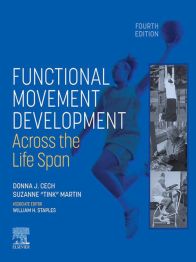Functional Movement Development Across the Life Span - E-Book, 4th Edition
Providing a solid foundation in the normal development of functional movement, Functional Movement Development Across the Life Span, 4th Edition helps you recognize and understand typical functional movement in individuals from infancy to older adulthood, providing a framework from which to identify movement disorders and effectively manage patients with abnormal motor function. Divided into three units, this edition describes 1) theoretical frameworks of development, motor control/motor learning, and health/wellness; 2) anatomical and physiological development of the body systems comprising the movement system (muscular, skeletal, cardiopulmonary, nervous, sensory, integumentary, and endocrine); and 3) life span description of the movement functions of posture, balance, locomotion, prehension, and fitness. This edition integrates themes of the movement system, life span development, and health/wellness, providing you with the most current information needed for clinical decision making and to be an effective practitioner. Written by physical therapy experts Donna J. Cech, Suzanne "Tink" Martin, and William Staples, this book provides the evidence-based information and tools needed to understand functional movement and manage patients' functional skills throughout the life span. Dr. Staples brings his expertise in geriatric physical therapy and exercise in aging, enriching content on aging throughout the book.
Providing a solid foundation in the normal development of functional movement, Functional Movement Development Across the Life Span, 4th Edition helps you recognize and understand typical functional movement in individuals from infancy to older adulthood, providing a framework from which to identify movement disorders and effectively manage patients with abnormal motor function. Divided into three units, this edition describes 1) theoretical frameworks of development, motor control/motor learning, and health/wellness; 2) anatomical and physiological development of the body systems comprising the movement system (muscular, skeletal, cardiopulmonary, nervous, sensory, integumentary, and endocrine); and 3) life span description of the movement functions of posture, balance, locomotion, prehension, and fitness. This edition integrates themes of the movement system, life span development, and health/wellness, providing you with the most current information needed for clinical decision making and to be an effective practitioner. Written by physical therapy experts Donna J. Cech, Suzanne "Tink" Martin, and William Staples, this book provides the evidence-based information and tools needed to understand functional movement and manage patients' functional skills throughout the life span. Dr. Staples brings his expertise in geriatric physical therapy and exercise in aging, enriching content on aging throughout the book.
New to this edition
- NEW! The movement system framework is incorporated throughout, as well as a focus on health and wellness.
- NEW! Clinical Implication boxes help you apply information into a clinical framework.
- Revised content throughout provides you with the most current information needed to be an effective practitioner.
- Updated references ensure content is current and applicable for today’s practice.
- NEW! An ebook version is included with print purchase. The ebook allows you to access all the text, figures, and references, with the ability to search, customize your content, make notes, and highlights, and have content read aloud.
Key Features
- More than 200 illustrations, tables, and special features clarify developmental concepts, address clinical implications, and summarize key points relating to clinical practice.
- A logical, easy-to-read format includes 13 chapters organized into three units covering the definition of functional movement, movement system contribution to functional movement across the life span, and functional movement outcomes.
- A focus on evidence-based information covers development changes across the life span and how they impact function.
Author Information


